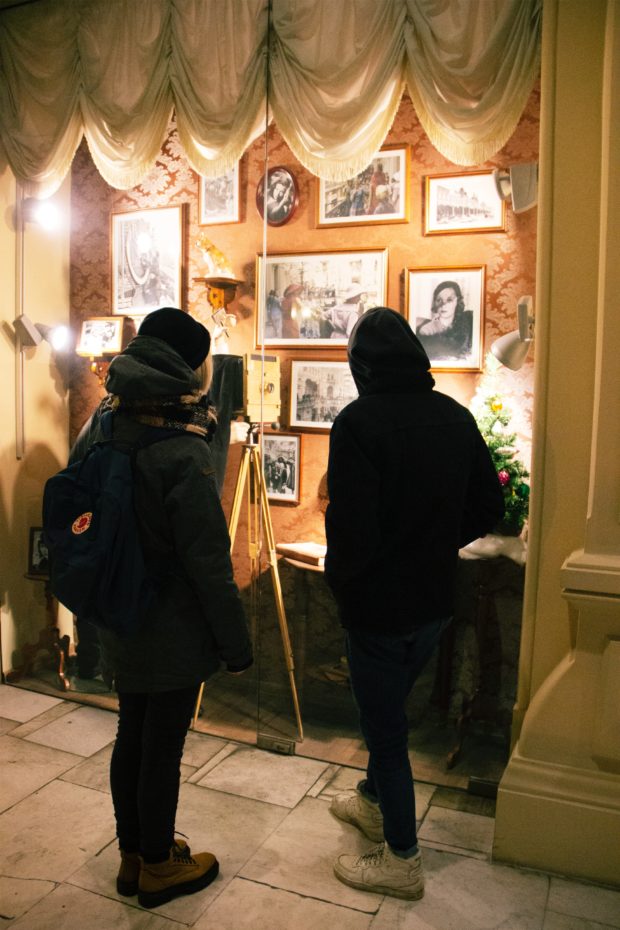You have no items in your cart. Want to get some nice things?
Go shopping
The way we became exhibits in our home started with an ad in the Komsomolskaya Pravda. We couldn’t believe it at first, there was no way we could afford something in Moscow’s city center. Now, when I hide the new TV behind a dusty sofa and wear a ‘30s-style dress from nine-thirty to four every weekday (including national holidays), I know we shouldn’t have believed it at all.
I wouldn’t admit this to Alyosha, but the tourists really bothered me. Or maybe what bothered me was what he was around them. At least once a day, I heard him screaming at someone relieving themselves in our bathroom, and the regret sank in a little bit deeper. Every morning, we heard the buskers prepare their instruments right under our Arbat-facing windows and we counted the repeated caricatures from the local artists. It developed a talent in me, I could pinpoint exactly how each visitor was going to be drawn on the street below us. It also pained me to know my husband would have had two giant fists and monkey ears.
His anger and curiosity filled everything in this flat. The move was meant to be a break from the cold Siberian air. We wanted to make a difference, a change in us, and something bigger than us. The tour groups we saw every day just reminded us that we couldn’t. Every day was the same. Historically, this was almost how my mother lived when she once tried to make it in the capital too. Except I have Wi-fi, even if I can’t share the password.
The rules were simple: live, don’t change anything, and pretend this was the USSR. Alyosha made his own rules and dictated where the tour groups went and what they knew. The ministry of culture hated that. They kept threatening to cut the funding for all home museums across the city, but we knew they were bluffing. There was just no way they would shut down the Bulgakov apartment or the Pushkin, and since we were protecting the oldest and most factually accurate flat, we knew we were safe. The security of this knowledge infuriated Alyosha even more. I just wished the tour groups would stop using megaphones.
On another ordinary day when I woke up and plugged in a secret toaster in a cupboard where we also hid the washing machine, Alyosha announced he had a plan. He was tired of living like a figurine. He couldn’t get a job since his arrest and as per the contract, one of us always had to stay in the flat. That one person was meant to be me. As an ex-ballerina with diabetes, I was never sure why the ministry thought I would be the ideal candidate to take over the rent. Perhaps it was the 30-year-old woman with a cane that gave tourists just enough opportunity to pity me but also feel too embarrassed to ask any questions. I too did not like to ask questions.
Alyosha’s plan to undermine the system that fed us stale brown bread and expired cognac was based on subversion. Alyosha had intimate knowledge of every installed camera in the apartment, and he knew all the corners that the ministry’s eyes couldn’t reach. Those were the only places I could see Alyosha’s bare back in the daylight. I still can’t quite fathom this, but I missed the marital freedoms of our communal University dorm. This flat was a way to make us comfortable and the money was easy, and I had to remind myself of that more lately.
Once Alyosha cleared his parameter, he started the printing. He would go to internet cafes and pay five rubles per black and white page. Two photographs would fit on A4, and he would come home with a big stack of paper and give them to me to cut and sign. This was past our work time, and we had to be strict with our schedule to make sure all eyes were diverted before we began. Each photograph seemed menacing to me, I did not like how they stared at me from the walls. Where there used to be blank spaces of peeling wallpaper and mold, there were now portraits of men and women that were dead long before Alyosha and I were born. Their portraits had my handwritten dates: 1925, 1931, 1940, 1946, 1950. Between them, newer colored photos appeared – the people we knew.
The tourists that came the next day were surprised to see the new space. They of course did not know it was new, as the only regular visitor was a neighborhood cat we were told to stop feeding, but Komsomolskaya Pravda probably told them a different story about our museum. Some people started coming more often, taking photos of Alyosha’s wall of remembrance and I wished so hard we could just follow the rules.
Alyosha explained to the visitors who everyone was and their cases. He went on to describe how they were taken from a street not far from the Arbat and were put back into a new time machine that was not so dissimilar from this apartment. Some people nodded and others frowned, and I knew it was not going to be long before I would cut out another photograph for the wall.
When they came for him, I did not ask questions. They would’ve taken me too, but they couldn’t because of my diabetes. They told me to pack and I had nothing to take – just my cane and their legally binding pity. Perhaps this was our big change.
I tuck the TV behind the sofa and straighten my dress. Alyosha’s photo peeks out from under the wallpaper and my handwriting is visible through its thinning fibers with this year’s date. He is the exhibit. And I’ll buy my own megaphone.

About Anya Goncharova Spence
Anya Goncharova Spence is a Moscow local with Ukrainian roots, born and raised in China, now found in the UK. She used to work as a book editor, then became a literary agent and is now working in podcasting. She is currently writing her debut novel.
- Web |
- More Posts(1)




